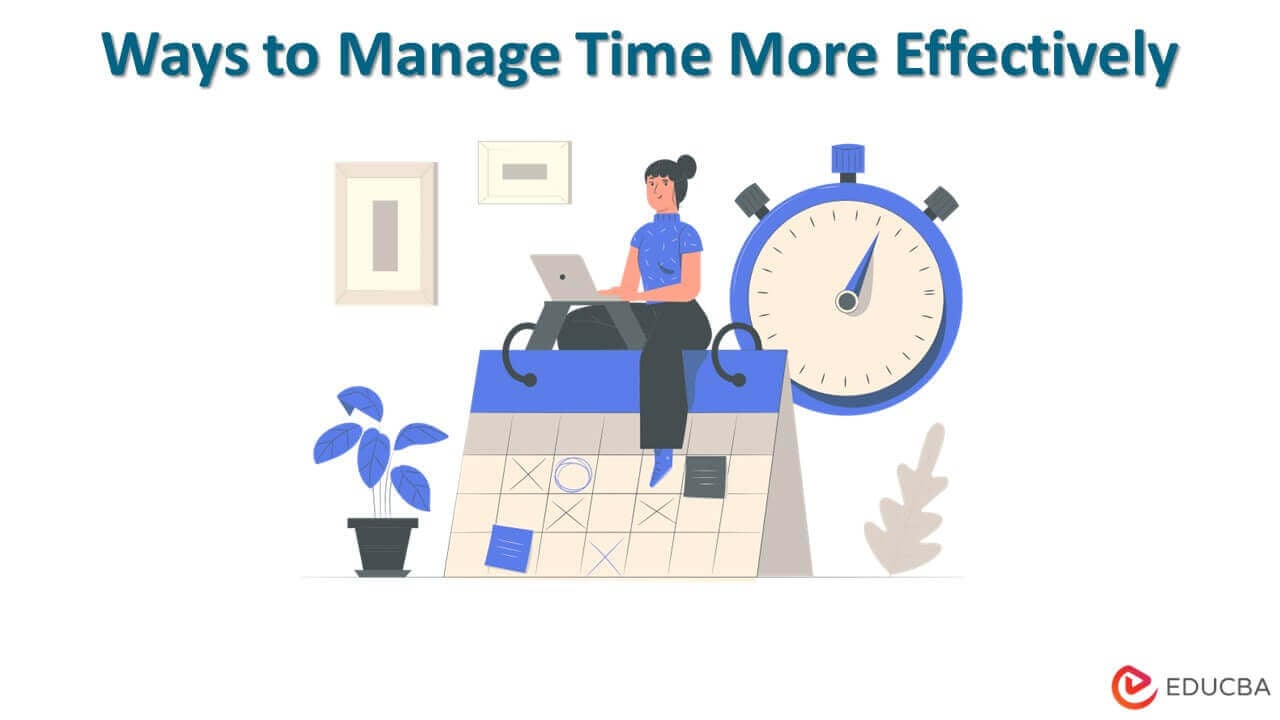Updated April 21, 2023

We all wish we had more time in a day. Once it’s over and we look back at what we achieved, we often wonder how all those 24 hours passed. Shortage of time is a major problem that most of us face. Time management could be an issue if you’re one of them. Most of us face time crunches in our life. We often say things like, “I don’t know where to find time,” “There’s not enough time in the day,” or “I have no time for myself.”
Time management is a skill
We often believe we never have time to finish our work because we’re overly busy responding to life’s curveballs. When we finally manage time to extract some time for ourselves, we are hit by a sudden development that demands immediate attention. Even when we are not facing any problems, we seem to find no time to manage our daily tasks.
So how do we find manage time for anything we do?
It all begins with organization
Time management is no elusive trick that only a handful of people understand. You can manage your time effectively as long as you get yourself organized. Without organization, it’ll be difficult to envisage what we have to accomplish during the day and how important all these things are to meet our long-term goals.
Once you organize your time, you not only acquire the ability to manage your daily tasks more effectively but also increase the possibility of allotting time where it’s needed i.e., towards the long-term goals you have in mind. If you have never set any such goals in the past, now is the time to begin. It’s a very important prerequisite for effective time management.
Why is setting goals important for managing time?
Goal setting tops the chart among all time management strategies. It helps in setting the playing fields. If you’re not aware of your aim, you may end up spinning the wheels the whole day and being repeatedly frustrated. If you want to manage time effectively and at the same time realize all your dreams and hopes, you must ensure clarity about what you want from your life.
-
Set clear goals
Few of us have the time to accomplish everything. Hence, it’s important to target our priorities. Set out your goals and spend most of your time on activities that will help you to attain these goals.
Attach topmost priority to activities that are urgent and important. Consider whether you have to spend time on things that may not be important but are urgent. Can these things be delegated to another person? Should you spend time on things that are neither urgent nor important?
Developing plans:
Mark your plans on priorities. Factor in the way you work. You may find that useful while planning for your first week. Then do the following for the day.
- Identify the tasks that will help you in achieving your goals. Allot time accordingly.
- Finish the small and urgent tasks first.
- Distribute work if there are other people who can do it, maybe more cheaply, effectively, and promptly.
- Ensure that others know what they have to achieve every day.
- Divide all the main tasks of the day into blocks of achievable work.
- Tackle them one by one.
Setting deadlines:
Set achievable deadlines for all activities. Set a final deadline comprising interim deadlines for long-term projects. Include time for contingencies. Longer projects require more contingency time.
Determine whether the deadlines are flexible or fixed. Never allow the less important work take a longer time than it should. If it’s worth only 10 minutes, ensure it’s done within that time.
Schedule your work to suit your temperament at various times of the week or day. For instance, if you’re the liveliest and the most outgoing in the late morning, schedule customer calls at that time.
-
Get organized
Getting organized is the second step towards effective time management. You must get organized if you want to manage time properly.
But how can you do that?
First things first, you must set your goals. If you haven’t done that, then stop reading further and go back to fix your goals.
Once the goals are set, you must organize them. What are your short-term and long-term goals? Break the long-term goals into milestones. In this way, you will have a target for each day, week, and month. Once you know what you must accomplish a year from now, you can easily break down the targets.
You know your aims once you have the list of goals broken down to milestones. You’ll get a better sense of purpose once you wake up in the morning. It will help ensure that you’re working a little bit every day to achieve these goals, regardless of how small the amount is.
When the goals are organized into milestones, and you have the list before you, you can’t overlook what must be done. If you don’t want to get organized, your mind has an easier way to help avoid the all-important daily tasks each day.
-
Prioritizing time
Veteran science fiction writer, Stephen D Covey, released a book titled “7 Habits of Highly Effective People” in 1994. In the book, he discusses a time management system that former US President Dwight D Eisenhower first introduced. The system splits activities into four quadrants that are based on a couple of factors: importance and urgency.
In a day, one can categorize a task into these four quadrants:
- Quadrant 1: Crises and emergencies. (Important and urgent)
- Quadrant 2: Long-term goals. (Important but not urgent)
- Quadrant 3: Interruptions. (Not important but urgent)
- Quadrant 4: Distractions. (Neither important nor urgent)
When you scan the list of your daily tasks and milestones, you can categorize the areas under which each falls. Spend a week first to track all the things you want to do. This is the best way to institute this method. Identify the areas where you spend time. Jot them down. If you spend 20 minutes calling your bill collectors, jot that down. If you spend an hour at the groceries, jot that down.
At the end of every day during the first week, write down the quadrant next to which each task fell. How much time did you spend watching TV (quadrant 4), dealing with crises and emergencies (quadrant 1), or working on long-term goals (quadrant 2)? Make sure you note all your tasks.
Look at your time in each quadrant at the end of the first week. Your goal in life should be to spend most of the time in the second quadrant and the least time in the fourth. So, how much time you spent in the second quadrant? Once you have finished the exercise, take your daily task list and make a note of the quadrant each of your tasks falls under.
Now, if you have watched TV for three hours, you were in the dismal fourth quadrant that day. You have to spend as little time as possible in this quadrant if you want to manage your time effectively. Sometimes we fail to understand how much time we’re wasting unless we carefully look into the matter.
-
Destroy procrastination
It’s one of the most difficult parts of time management. Procrastination often raises its ugly head. But how can we avoid it? We can set our goals well, organize, and divide the time according to our priorities. But if we fail to follow the list of things we’re supposed to do daily, we’re wasting all our time.
How to avoid it?
Procrastination, labeled a silent killer, is perhaps the biggest deterrent to our goals. All of us say that we want to achieve something. But when it comes to managing our own time efficiently, we fail in that regard. Procrastination emerges from every single corner.
But the only way to avoid procrastination is to be aware of what needs to be done. Once you have set clear goals, organized yourself, and prioritized your time, you will be on your way to avoiding all possibilities of procrastination. If none of your strategies work, try out the 15-minute rule.
Set a timer on your smartphone or watch. Now, start doing something you have been putting off for only 15 minutes. Well, that’s just about the time you need. You’ll soon realize Newton’s second law of motion: an object in motion stays in motion. You’ll likely keep going once you have begun unless something or someone compels you to stop. The most difficult part is to start something in the first place.
-
Multitasking
All of us possess multitasking skills. Whether you’re capable of doing it or not is not important. If you can multitask, it’s great. But if you’re not, don’t lose sleep over it. Many people become less effective while trying to multitask. The result is starting several projects simultaneously, none finishing because of sloppy work. This causes much disappointment to the people.
Know when to multitask:
That also doesn’t mean that anybody who can multitask should carry on doing it all throughout the day. Constantly involving in several projects simultaneously isn’t always a great thing to do. You have to be aware of when not to multitask. For instance, every day at work, a few typical checklist-type activities could be completed. In most cases, they are mundane and boring. So what can you do? Try to finish as many of them within the least possible time. But when you are allotted a special project that has to be finished within a specified time and with the highest quality, devote the maximum time to it and concentrate on no other project. You can thus fully concentrate on the work at hand. It’s important to know when to multitask.
-
Reduce interruptions
Reduce the number of interruptions in your life. Frankly speaking, you can’t reduce the number of things that may interrupt your work. But you can change the way you usually deal with them. What do you do when you’re working on something important and someone comes to you with work that can be done later? Say something like, “Of course we can do that. But let me finish what I am doing right now and then we’ll take care of it.” It’s important to respectfully put off the less important work for the sake of the work that demands your immediate attention.
At the same time, if your superior calls you when you’re in the middle of something, then that’s an interruption that is worth a priority.
How to tackle the typical pitfalls?
The most common mistake in time management is trying to do everything yourself. Delegate the routine jobs to your subordinates. If anyone is eager to do one of your less important jobs, delegate that too. It can be a good time management training module opportunity for them.
Here are some other points to consider to tackle the typical pitfalls:
- Sort out all your projects regularly to ensure they are in order.
- Tackle all large projects in sections. You don’t need to do all things at once. That’s a big mistake most people make. Delegate some of the sections if that’s possible.
- Concentrate on staying focused. You can paste this message on the board: “What is best use of my time right now?”
Final words
Whether you’re a top executive, a manager, or a junior employee, more time in your hand will help you to focus on the more important tasks. Being organized, prepared and disciplined will give you more productive time to complete more projects.
Recommended Articles
Here are some further articles to learn more:



